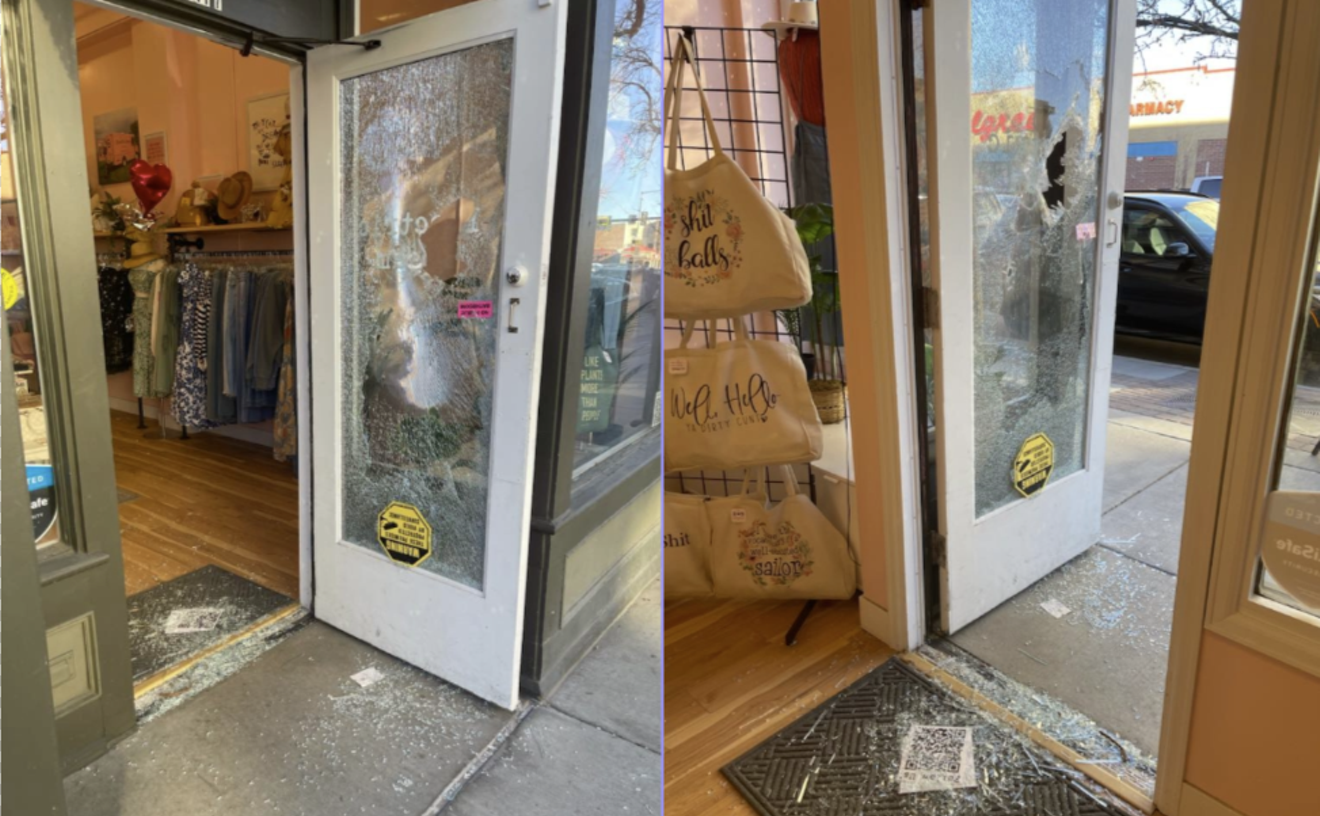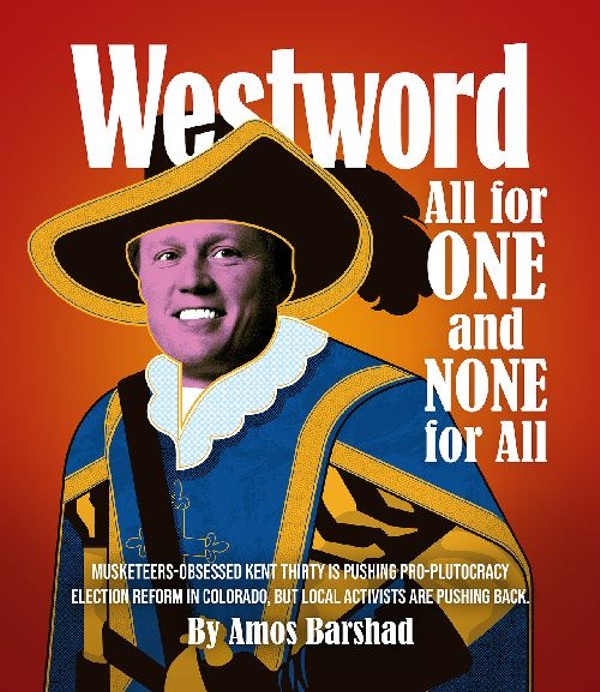"I'm just so uncomfortable having anyone I can't see walk through the house," she says, rushing toward the noise. "I just can't help it. It's old stuff. Old, old stuff, but it's still with me."
Van Derbur knows her fear is not rational. She knows the footsteps are those of a photographer, scouting the house with her permission for the best early-afternoon light. She knows she is safe. But she feels afraid, because the deep-down part of Van Derbur that is raw feeling, that still hurts, bleeds and dreads, does not hear the footsteps of a benevolent stranger, but the ghost of her father, padding toward her in felt slippers.
Her father was a rich and powerful man. His name was Francis S. Van Derbur, but his friends -- and he had many -- just called him "Van." He owned mortuaries and made himself a millionaire. He was a socialite, a philanthropist, a renaissance man who recited poetry from memory -- and a rapist of children who violated his own daughter hundreds of times.
"Terror was my nightly blanket," Van Derbur writes in her award-winning autobiography, Miss America By Day, which was published last year. "Many times he wouldn't come to my room until close to midnight. Sometimes he wouldn't come at all. The waiting, however, was every night. My father always wore a white terrycloth robe and gray felt slippers. I would listen so hard, I could actually feel my ears listening -- like megaphones reaching out to catch the slightest sound. Many times I wouldn't hear his felt slippers on the linoleum steps leading to my room but I would always hear the slow turning of the knob on my bedroom door and then the scuff, scuff to my bed.
"The second I felt his hands on me I would tighten every muscle as tightly as I could, like a starfish does if you turn it over and touch it with a stick. I would shut my eyes; squish them closed until they hurt from squeezing them so hard. I wouldn't open them again until he left. He usually stayed at least an hour. He pried me open night after night. Like a delicate piece of crystal smashed into concrete, my father took my belief system, my sense of self, my very soul, and shattered it into shards."
Now 67 years old, Van Derbur is still picking up the pieces. She still has trouble sleeping, or feeling safe. She has automatic, descending steel security shutters installed to fit all the windows of her home, so that with a click of a button, she can transform her elegant Hilltop ranch into a modern fortress. She knows the footsteps belong to the photographer, but she has to see for herself. She tracks him down, and he poses her for the photo shoot in the entry hallway, near a framed front page of the February 15, 1964, edition of the Rocky Mountain News.
The top headline reads, "Cyprus Is Facing New War Danger." Below the fold is this headline: "Marilyn Married in Mountain Retreat." The story begins, "Miss America of 1958, Marilyn Van Derbur -- now Mrs. Lawrence Atler -- and her smiling bridegroom pose before a picture window framing a Colorado winter wonderland after a snowy Valentine's Day wedding in the Indian Hills summer home of the bride's parents, Mr. and Mrs. Francis S. Van Derbur. The wedding was scheduled in the Van Derbur's mountain lodge at Black Lake, Colorado, but a snowstorm forced a change in plans."
A photo shows 26-year-old Marilyn Van Derbur standing with her new husband. She is smiling. But she is not simply smiling; she is turning on the Marilyn Van Derbur all-American beam. She is radiating absolute innocence and wholesomeness. She is the girl next door, and she is perfect and happy.
Van Derbur still has that smile, and when she turns it on, the air smells of fresh-baked pastries, and all is right and good in the world for a moment -- until she turns off the smile with unsettling ease.
When Van Derbur talks about child molestation, her demeanor is fierce, and her turquoise eyes burn with a natural-born warrior's zeal for battle. She rattles off shocking statistics like this: "One in six boys and one in four girls are sexually violated before the age of eighteen in this country; fourteen-year-olds comprise the greatest number of sex offenders of any age group. If those statistics don't frighten you, you are in total denial." Or sums up the feelings of victims of child molestation like this: "We stay shamed by acting ashamed, when we have nothing to be ashamed of. Together we must say to every violator, ŒThe child may be mute today, but someday the child will speak her name and your name. The children will speak every single name!'" And as she says these words, her eyes shine and her face hardens. But the second the camera is pointed her way, she turns on The Smile, and angels sing while the shutter clicks.
On her wedding day, Van Derbur wore The Smile like a mask as her father led her down the aisle. She wore The Smile on stage in Atlantic City, along with Miss America's sparkling tiara balanced atop her flawless hair and the winner's sash draped over her strapless, snow-white gown. Her father commissioned a portrait of Marilyn in that pose, wearing that costume, and he hung her wearing The Smile, captured in oil paint, over the white sofa in his office. The Smile also starred in a Parade magazine cover story that ran a few weeks after she became Miss America, in which her parents made this joint statement: "Marilyn's 35-25-36 figure didn't come by accident. She fought for it, by skiing, swimming, playing tennis and riding horseback. Sports gave her self-assurance, poise and vitality. Those qualities clinched the title for her." When the reporter compared their daughter to Princess Grace of Monaco, her mother countered, ''Actually, she is more like a queen.''
Today, Marilyn Van Derbur will not refer to her mother as her mother, only as "the woman who gave birth to me."
"She was not my mother; I did not get a mother," she says. "Real mothers protect their young." Van Derbur believes her mother knew all about her father's nighttime predations, yet did nothing out of fear of damaging their image as the perfect Denver family and of falling from social grace, of losing face and position.
"If my father came into my room one night a week for thirteen years, that's 676 nights," Van Derbur writes in Miss America. "One night is my most vivid memory. My father had come into my room that night later than usual...around midnight. I was awakened by feeling his hands on my skin. He had been in my room for at least thirty minutes when we both heard footsteps. We hadn't heard my mother on the carpet walking down the long hallway but the second she stopped on the top linoleum step, we heard the click of her shoe. She always dressed for bed in a light pink or blue negligee and dressy slippers with leather heels.
"Click. She was on the first step. Then slowly, very slowly, click, down to the second step. Then even more slowly we heard the third click as she stepped down the third step. My door was less than six feet away. Finally! My mother was coming. Finally it would be over. At the sound of the first click, my father had frozen. I had frozen. We remained motionless...It was a dramatic moment in time when each of us knew what the other was thinking. Then we heard another click, but she wasn't coming to save me, she was going back up the steps. She knew.
"There was never any doubt in my mind after that night that she knew. She walked away from me, back into her perfect world -- a world in which she was admired, respected, and charming. I knew she would never come back, and for the hundreds and hundreds of nights remaining she never did."
In 1978, when she was forty years old, Van Derbur confronted her father. "I was absolutely terrified," she remembers. "I told him that what I was telling him was the most difficult thing I had ever done, and he said, 'Just a minute,' and climbed up the winding staircase, two steps at a time, to his room on the second floor."
She knew he was going to get a gun. He came back downstairs and then listened to his daughter in silence for twenty minutes as she told him what she remembered and how it had damaged her. He did not deny anything. He said, "'If I had known what this would do to you, I never would have done it."
Then he pulled the gun from his pocket and said that if she had threatened him to go public with her accusations, he would have killed himself, right then and there. She felt an implicit threat in this statement. "I sensed that he would have shot me first, then himself, and I know he would have done it," she says. "He was that cold."
Van Derbur and her father never spoke of incest again. He died in 1984, and one year later, when Marilyn confronted her mother, "Bootsie" Van Derbur refused to accept as true the accusations her daughter made against the late, great Van.
"Deep, heaving sobs took over," Van Derbur writes. "I remember the thoughts I had, as I tried to control myself so I could try to form words. 'Why is she just sitting there? Why isn't she holding me? Comforting me?' I don't remember what words I spoke. I do remember knowing that when I said two specific words she would get it. 'Daddy. Bedroom.' Nothing could have prepared me for what happened next. She was sitting straight up in her chair with her arms folded across her chest, and she said, 'I don't believe you. It's in your fantasy.'"
Four years later, while her mother was still alive, Marilyn Van Derbur went public with her story. The Atler family had donated $260,000 to establish the Kempe Adult Survivors Program at the Kempe Center, the Denver-based organization that's a world leader in the prevention and treatment of all forms of child abuse, including sexual abuse. And in May 1991, Van Derbur agreed to give a speech at the ceremony celebrating the new Kempe program.
After she won the Miss America contest, Van Derbur made a good living on the lecture circuit. She was the only woman hired by General Motors to travel the country, giving inspirational lectures as part of the automotive giant's guest-speakers program. She also had hosted more than twenty network television specials and was the spokeswoman for the popular AT&T Bell Telephone Hour.
But as she approached the microphone at the Kempe ceremony and looked out at the audience, which included a newspaper reporter, Van Derbur knew she was about to make the most difficult and profound speech of her life.
"Tonight I break my silence," she said. "That means shining a bright light into the blackness where my 'nightchild' has been hidden for so many years. It means speaking the unspeakable word. Saying the specific word that I was never able to say -- not to my husband or daughter. Saying the ugliest six-letter word in the English language. The word is 'incest.'"
She spoke of how her childhood and adolescent personality split in two, how she "disassociated" into a "daychild" and a "nightchild."
"During the days, no embarrassing or angry glances ever passed between my father and me because I had no conscious knowledge of the traumas and terrors of the nightchild," she explained. "But the more degraded the nightchild became, the more the daychild needed to excel -- from the University of Colorado's ski team, to being a debutante, to graduating Phi Beta Kappa, to being named Miss America. I believed I was the happiest person who ever lived."
Only the youth pastor at her church sensed her dark secret. When she was 24, he punctured the barricades that she had built in her mind, and the truth spilled out. She also told the love of her life, Larry Atler, whom she'd repeatedly pushed away. And then she began to work on her public-speaking career at a crazed pace, allowing no time to deal with all the memories that were coming to the surface.
"Even with medication, I could not allow deep sleep," she told her audience. "Beneath my closed eyelids was another set of eyes, always open, always aware of any movement in the room. Nor did my ears sleep. The slightest sound was petrifying. Every night of every week, of every year, I could find no peace, because almost every night at precisely 2 a.m., I would awaken in terror. I sensed that a man was entering my bedroom. I could feel his presence. Too terrorized to move, I would lie there until morning, unable to go back to sleep. For 33 years, the black hours were endless."
In the mid-'70s, Van Derbur said, she returned to Denver after a successful speaking engagement and felt a compelling urge to lie down, "as though my body were being drawn down by a huge magnet." She lay in bed like a dead person in a casket, stricken by a paralysis that would afflict her sporadically for the next decade. Looking back, she realized the onset of this paralysis coincided with her only child, her daughter, turning five -- the age Marilyn was when her father began to come into her room at night.
"In 1984, when Jennifer began entering puberty, I became completely dysfunctional," she said in her Kempe speech. "At the height of my career, having recently been named the Outstanding Woman Speaker in America, my life was stopped. From 1984 to 1989, there were many times when I thought I would lose my mind.... In deep despair, I was often dysfunctional for long periods. I looked upon death as peace -- as a release from a mind and body that could no longer contain the agony."
This was the reason she was helping found the Kempe Adult Survivors Program, she said.
"This program will help families understand how they can help the healing process. When a good friend of mine knew I would be speaking here tonight, she said, 'Why do you want to ruin your father's reputation? Write an article and do it anonymously.' This was my father's greatest weapon. He knew I would never tell. It has been thirty years since I consciously learned of my nightchild, but I say to my father tonight, 'You were wrong.' We must say to every member of our society: If you violate your children, they may not speak today, but as we gather our strength and stand beside them, they will, one day, speak your name. They will speak every single name. It is not my father's reputation that I seek to destroy. As difficult as this is for most people to understand, myself included, I loved my father. It is innocent children and mute adults that I hope to help free. If I cannot speak the truth with my father dead, how, dear God, can we expect a child to speak?"
Van Derbur's revelations made national news, and she began a second successful public-speaking career, this one as a high-profile survivor of childhood sexual abuse. But not everyone in her home town respected her decision to bring down her father. Rocky Mountain News columnist Gene Amole, who always began his columns with a one-word declaration, started his take on Van Derbur's speech with "Assassination" and ended with this: "What this really boils down to is one person's word against another's, or as in Marilyn's case, her word against her father, who is dead and cannot respond.''
(Actually, one of Marilyn's three sisters had already come forward to corroborate her story and reveal that their father had victimized her as well.)
Amole's column coaxed readers to remember all the good things Francis Van Derbur had done, like give lots of money to worthy causes, including the Boy Scouts. For the next three years, Van Derbur and Amole dueled. In September 1994, Amole wrote a column that was an open letter to her.
"Dear Marilyn," it began. "You have been demonizing me in your appearances for three years and I have said nothing. At one point, you suggested I was part of an 'old boy network' protecting men who commit incest. You even bad-mouthed me when you met with state legislators. You are angry because I suggested that some cases of repressed incest memory may be bogus...Why is it, Marilyn, if you hate your father so much, that you cling tenaciously to his name? Why aren't you just Marilyn Atler instead of Marilyn Van Derbur Atler? You know what I think? You thrive on notoriety to feed your ego. You love the spotlight. In your heart you still hear Bert Parks singing, 'There she is, Miss Amer-i-ca.' I have watched your testimony of sexual abuse several times. Not long ago I had a sleepless night and went downstairs at 3 a.m. to zap through the TV cable channels. There you were on one of the public-access channels, clutching your doll and talking about the 'daychild' and the 'nightchild.' I'll give you this, Marilyn, you do a dynamite show. You look like Saint Marilyn with that beatific expression on your face. I am sure you have helped some women confront their incest experiences and you deserve credit for that, but now it is beginning to look as though you are no longer helping. You are exploiting. You went public with your repressed memories after people forgot you were Miss America of 1958. You weren't getting any invitations to make your motivational speeches. And then all of a sudden, BINGO, incest! You were in People magazine and on network television. You were a celebrity again.... But there is so much more to living than being a professional victim. Get a life, Marilyn. Get a life."
By that time, Van Derbur was indeed a celebrity again. In the early days of e-mail, she was receiving mailbags full of letters every day, most from survivors of childhood sexual abuse. (Since going public, she has corresponded with more than 8,000 of them.) She was back on the lecture circuit, and survivors were lining up for hours to talk to her after her speeches.
"A lot of them want me to be their mother," she says. "I tell them, 'I can help you, and I can be in your life, but I can't be everything you want me to be.'"
At the end of a speech, Van Derbur asks all survivors in the audience to silently stand. Some people always do. "I ask survivors to stand because it was standing in the light that changed my life forever," she says. "When newspaper reporters took me forward, I was standing in the light. Within a period of two weeks, my shame was gone."
In 1992, Van Derbur spoke at the University of Colorado Medical Center before an audience of about a hundred doctors. One of them was Fred Mimmack, a respected psychiatrist and teacher at the center who'd practiced medicine in Denver for more than thirty years and was then in his late fifties.
"When I asked survivors to stand, this man stood, and it just sucked the oxygen out of the room," Van Derbur recalls. "He was in the third row, and he was about 6'4", and he didn't look left or right, he just stared straight ahead, and all I could think of was this lone pine tree standing erect in a storm. He didn't know several others were rising behind him."
Remembers Mimmack: "I was not prepared for what she did, but it took almost no thought for me to stand. It was the truth, and it was a relief to say it by standing. There is a Spanish proverb which says, 'A life lived in fear is half a life.' A life lived in shame is half a life as well."
Van Derbur still speaks in public often, most recently to the national convention of the Survivors Network of Those Abused by Priests, which was held in Colorado earlier this month to coincide with a national gathering of Catholic bishops in the Denver area.
"I opened by saying that they are the ones who brought the horrors of sexual abuse into the consciousness of America and, indeed, the world," she says of her keynote address to SNAP. "Many not only had the courage to come forward and speak publicly, they had the courage to take on the Catholic Church! I knew their stories, their struggles. I also knew that many of their survivor friends had committed suicide and that they are still grieving. It was a very powerful morning for me. All survivors are in their debt."
Last year Van Derbur self-published Miss America By Day, subtitled "Lessons Learned From Ultimate Betrayals and Unconditional Love." The book spent thirteen weeks in the top ten of Colorado's non-fiction bestsellers list, which tracks statewide sales of all books published in the country, and in May it won first place in the prestigious Writer's Digest awards as the Most Inspirational Book published in 2003.
Though printed under one cover, Miss America By Day is really two books disguised as one. The first is Van Derbur's autobiography, a survivor's tale. The second is perhaps the single best clearinghouse of meticulously sourced information on the pervasive evil of childhood sexual abuse in this country, as well as a "how to" guide on how to talk to children about inappropriate touching by those they know: their siblings, coaches, priests, babysitters and fathers. (The vast majority of sexual assaults on children are committed by family members or acquaintances, not strangers.)
"We are just now beginning to come of age with this problem as a society," Van Derbur says. "It would never have entered our minds thirty years ago to worry about our kids at camp." It is a few days after the death of former president Ronald Reagan, and she holds up that day's USA Today, in which Reagan's son, Michael Reagan, reveals that he was sexually abused by a camp counselor when he was a boy. "It's like Maya Angelou says: 'We did what we knew. When we knew better, we did better.'"
Almost fifty years after the terror ceased for the nightchild, Marilyn Van Derbur's doing better.
"The truth was devastating to me," she says, "but it did set me free."
And then she smiles.










